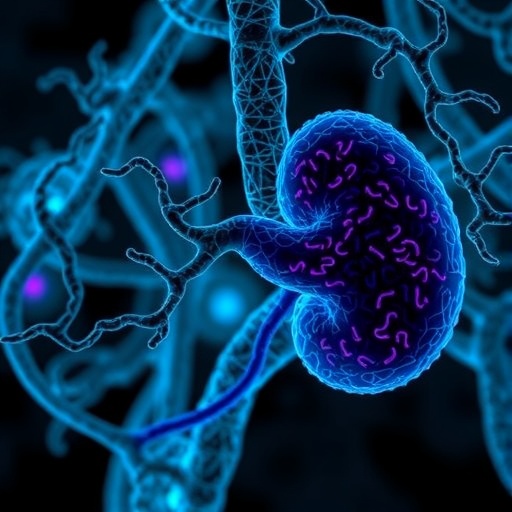
In a groundbreaking advancement in the fight against pancreatic cancer, researchers have illuminated a novel molecular pathway that could pave the way for transformative therapeutic strategies. Pancreatic cancer remains one of the deadliest malignancies worldwide, often diagnosed late and resistant to conventional treatments. The latest study, conducted by Ma, Cheng, Jia, and colleagues, uncovers the intricate biochemical interplay through which Demethylzeylasteral exerts potent anti-cancer effects by modulating epigenetic markers and transcriptional regulators central to tumor progression.
Demethylzeylasteral, a natural compound derived from traditional medicinal plants, has captured scientific attention due to its multifaceted pharmacological properties, including anti-inflammatory and anti-tumor activities. This recent investigation delves into its molecular mechanism, revealing how it specifically targets the expression of MESP1, a transcription factor implicated in oncogenic processes. By diminishing the levels of histone modification H3K18la—a lesser-studied but critical epigenetic mark—Demethylzeylasteral represses MESP1 transcription, thus impeding the downstream signaling cascades that facilitate pancreatic tumor malignancy.
At the heart of this discovery lies the nuanced role of histone lysine lactylation (Kla), particularly at histone H3 lysine 18 (H3K18la). This epigenetic modification has emerged as a pivotal regulator of gene expression, linking cellular metabolic states to transcriptional outcomes. Elevated H3K18la levels have been observed to promote oncogenic gene expression profiles in various cancers, but its mechanistic underpinnings remained elusive until now. The study demonstrates that Demethylzeylasteral treatment leads to a significant reduction in H3K18la levels in pancreatic cancer cells, thereby attenuating the transcriptional activation of MESP1 and disrupting malignant phenotypes.
.adsslot_LqleCaKAJQ{ width:728px !important; height:90px !important; }
@media (max-width:1199px) { .adsslot_LqleCaKAJQ{ width:468px !important; height:60px !important; } }
@media (max-width:767px) { .adsslot_LqleCaKAJQ{ width:320px !important; height:50px !important; } }
ADVERTISEMENT
MESP1 itself is recognized for its critical regulatory functions during embryogenesis and cellular differentiation; however, aberrant overexpression in tumors has been correlated with enhanced proliferation, invasion, and metastasis. The suppression of MESP1 by Demethylzeylasteral elucidates a direct epigenetic control route that can be exploited therapeutically. Through a series of sophisticated experiments employing chromatin immunoprecipitation, RNA sequencing, and functional assays, the researchers validated that the downregulation of MESP1 is a primary driver behind the observed decrease in cancer cell viability and motility.
This research is particularly significant given the aggressiveness of pancreatic ductal adenocarcinoma (PDAC), the most common form of pancreatic cancer, known for its dense stromal environment and resistance to chemotherapy. Traditional treatment modalities have yielded limited success, highlighting the imperative need for novel molecular therapies. By targeting epigenetic modifications like H3K18la, Demethylzeylasteral introduces a new paradigm that circumvents conventional genetic mutations, focusing instead on the dynamic regulation of oncogenic transcription.
Another compelling aspect of the study is its contributions to the broader field of cancer epigenetics. Histone lactylation, although a relatively recent addition to the catalog of histone modifications, has rapidly gained recognition for modulating gene expression in response to metabolic and microenvironmental cues. By positioning H3K18la as a key molecular nexus in pancreatic cancer progression, the findings underscore the therapeutic potential of targeting histone modifications beyond the commonly studied acetylation or methylation marks.
From a translational perspective, the utilization of Demethylzeylasteral could entail a multipronged approach in pancreatic cancer management. Apart from directly inhibiting malignant cell proliferation, its impact on the tumor microenvironment and epigenetic landscape might synergize with existing treatments to overcome resistance mechanisms. This study sets a foundation for subsequent preclinical and clinical evaluations aimed at harnessing Demethylzeylasteral or its derivatives as adjuvant or standalone agents.
Furthermore, the study’s methodological framework combining epigenomic profiling with functional cellular assays exemplifies the cutting-edge approaches driving modern oncology research. By integrating advanced bioinformatics with molecular biology techniques, the researchers were able to delineate a comprehensive map of the interactions between metabolic processes, epigenetic modifications, and transcriptional regulation. This interdisciplinary strategy not only validates the therapeutic relevance of targeting H3K18la but also opens avenues for discovering other epigenetic vulnerabilities in hard-to-treat cancers.
An intriguing implication of this work lies in its contribution to understanding the metabolic-epigenetic axis within tumor biology. Since histone lactylation originates from cellular metabolites like lactate, the findings highlight how altered cancer metabolism directly influences gene expression through epigenetic remodeling. Such insights enrich the conceptual framework that connects tumor microenvironment acidity and metabolic reprogramming to epigenetic regulation, suggesting that compounds modulating these epigenetic marks can indirectly rectify aberrant tumor metabolism.
Moreover, by demonstrating that Demethylzeylasteral effectively reverses malignant behaviors by targeting a specific epigenetic modification, the study challenges the prevailing notion that epigenetic therapies must broadly affect global chromatin states. Instead, precision modulation of defined histone marks can yield selective anti-tumor effects, thereby minimizing off-target consequences and enhancing therapeutic specificity.
The translational potential of this discovery cannot be overstated. Pancreatic cancer’s notoriously poor prognosis stems largely from late detection and tumor heterogeneity. Interventions such as Demethylzeylasteral that target fundamental epigenetic regulators might not only suppress tumor growth but also sensitize cancer cells to immunotherapy and chemotherapy. Future research into combination therapies incorporating epigenetic agents holds promise for significantly improving patient outcomes.
Importantly, this work also underscores the value of natural products in drug discovery, especially for complex diseases like cancer. Nature-derived compounds often possess intricate molecular architectures and unique bioactivities not easily replicated synthetically. Exploring the pharmacodynamics of Demethylzeylasteral and related compounds may reveal additional mechanisms pertinent to cancer biology and expand the repertoire of epigenetic modulators available for clinical development.
While the study primarily focuses on pancreatic cancer, its implications may extend to other malignancies where aberrant histone lactylation and MESP1 overexpression play roles. The universality of epigenetic regulation across cancer types suggests that insights gained here could inform broader oncological research and therapeutic innovation.
In conclusion, this pioneering research delineates a novel epigenetic mechanism by which Demethylzeylasteral exerts anti-cancer effects in pancreatic cancer. Through the targeted reduction of H3K18la and subsequent suppression of MESP1 expression, the compound inhibits malignant behaviors at the molecular level, offering a promising new avenue for therapeutic development. As pancreatic cancer continues to present formidable clinical challenges, such molecularly targeted interventions herald a hopeful future in oncology.
Subject of Research:
Pancreatic cancer molecular mechanisms; epigenetic regulation via histone lactylation; therapeutic effects of Demethylzeylasteral targeting MESP1 expression.
Article Title:
Demethylzeylasteral suppresses the expression of MESP1 by reducing H3K18la level to inhibit the malignant behaviors of pancreatic cancer.
Article References:
Ma, X., Cheng, M., Jia, Y. et al. Demethylzeylasteral suppresses the expression of MESP1 by reducing H3K18la level to inhibit the malignant behaviors of pancreatic cancer. Cell Death Discov. 11, 305 (2025). https://doi.org/10.1038/s41420-025-02603-9
Image Credits: AI Generated
DOI: https://doi.org/10.1038/s41420-025-02603-9
Tags: anti-cancer natural compoundsDemethylzeylasteral pancreatic cancer treatmentepigenetic regulation in cancerhistone lysine lactylation rolehistone modification H3K18lainnovative therapeutic strategies for pancreatic cancer.MESP1 transcription factor suppressiononcogenic processes in pancreatic cancerpharmacological properties of Demethylzeylasteralsignaling cascades in malignancytraditional medicinal plants in cancer therapytumor progression mechanisms



